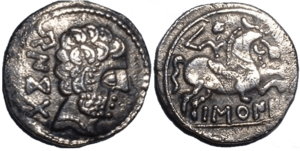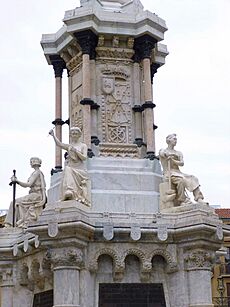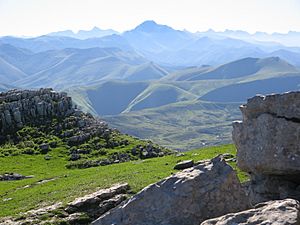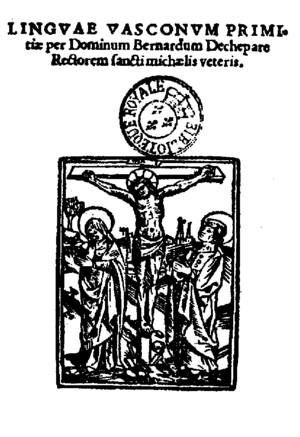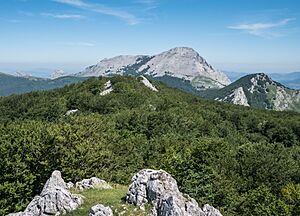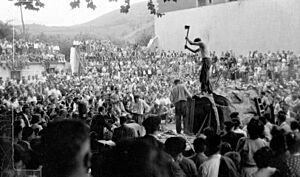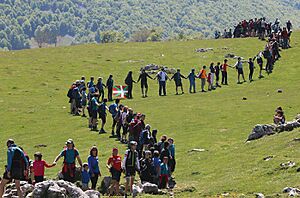Basques facts for kids
| Euskaldunak (Basque) Vascos (Spanish) Basques (French) |
|
|---|---|
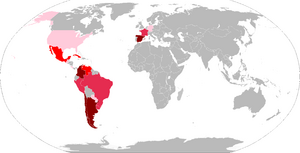 |
|
| Total population | |
| c. 3 million | |
| Regions with significant populations | |
| Spain (people living in the Basque Provinces of Spain, including some areas where most people do not identify themselves as Basque) |
2,410,000 |
| France (people living in the French Basque Country, not all of whom identify as Basque) |
239,000 |
| United States (self-identifying as having Basque ancestry) |
57,793 |
| Canada (including those of mixed ancestry) |
7,745 |
| Languages | |
| Basque (L1 or heritage) Spanish, French, Gascon (L2 or regional L1) |
|
| Religion | |
| Christianity (mostly Catholicism), others | |
The Basques are a European ethnic group from a place called the Basque Country. This region is in the western Pyrenees mountains, where northern Spain and southern France meet.
What makes the Basques unique is their ancient Basque language, their special culture, and their shared history. They are thought to be one of the oldest groups of people in Europe. Basques call themselves euskaldunak, and they call their homeland Euskal Herria.
Where the Name "Basque" Comes From
The English word Basque comes from the French word Basque. This word came from the Latin word Vasco. The Romans used Vascones to describe the people who lived in this area thousands of years ago.
In their own language, Basques call themselves euskaldunak. This word is formed from euskal, which means "Basque (language)," and -dun, which means "one who has." So, an euskaldun is a "Basque-speaker."
In the 19th century, a new word, euskotar, was created. It means a Basque person, whether they speak the language or not.
A Unique History
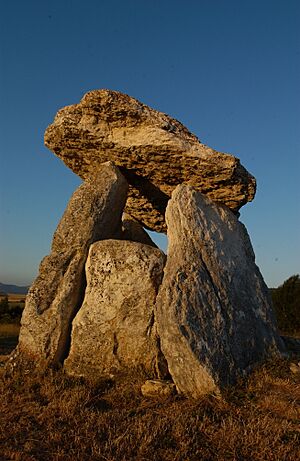
Scientists who study genetics have found that the Basques are very distinct from other people in Europe. This is likely because they have lived in the same mountainous region for a very long time. This isolation meant they did not mix as much with other groups.
Because of this and their unique language, many think the Basques are descendants of the first modern humans who settled in Europe. While they are unique, their DNA is still very much European, especially similar to other people from Western Europe.
Key Moments in Basque History
The Basque people have lived in their homeland for thousands of years. Ancient Roman writers like Strabo and Pliny wrote about Basque tribes, such as the Vascones and the Aquitani. Even back then, they spoke an early version of the Basque language.
In the Middle Ages, the Basques had their own kingdom called the Kingdom of Pamplona, which later became the Kingdom of Navarre. This was a powerful kingdom in the Pyrenees mountains. However, it was surrounded by larger and stronger neighbors like Castile (part of Spain) and France.
Over time, the Kingdom of Navarre was weakened by wars. In the 16th century, most of it was conquered by Spain. The small part of Navarre north of the Pyrenees mountains remained free for a while but later became part of France.
For centuries, the Basques had special laws called fueros. These laws gave them a lot of freedom and self-government. However, they lost these rights after the French Revolution in France and the Carlist Wars in Spain during the 19th century. Since then, many Basques have worked to get more self-government and protect their unique culture.
The Basque Homeland Today
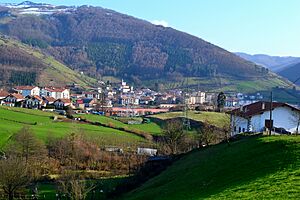
The Basque Country is not a single country. It is divided between Spain and France.
Basque Country in Spain
In Spain, the Basque region is made up of two autonomous communities:
- The Basque Autonomous Community (BAC) includes three provinces: Álava, Biscay, and Gipuzkoa. Its main cities are Vitoria-Gasteiz, Bilbao, and San Sebastián. About 2.1 million people live here. Both Basque and Spanish are official languages.
- Navarre is a separate community with its own government. Its capital is Pamplona. About 600,000 people live in Navarre. Spanish is the main official language, but Basque is also an official language in the northern part of the region.
Basque Country in France
In France, the Basque region is known as the French Basque Country or Iparralde ("the North Side" in Basque). It is part of a larger French department and does not have its own government. About 250,000 people live there. The Basque language is not official in France, and fewer people speak it there today.
Basques Around the World
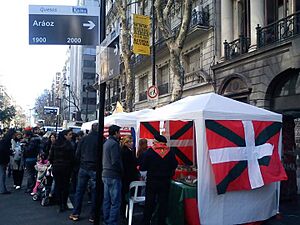
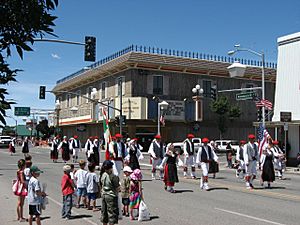
Over the centuries, many Basques left their homeland for economic or political reasons. This is called the Basque diaspora. Millions of people with Basque ancestors now live all over the world.
Large Basque communities can be found in Latin America, especially in countries like Chile and Argentina. Many early settlers in these countries were Basque.
In the United States, many Basques settled in the West, in states like Idaho, Nevada, and California. They often worked as shepherds and ranchers. Today, cities like Boise, Idaho, have a strong Basque community with museums, cultural centers, and festivals.
A Rich and Unique Culture
The Basque Language
The Basque language, or Euskara, is at the heart of Basque culture. It is a language isolate, which means it is not related to any other language in the world. This makes it very special.
For many Basques, their identity is strongly tied to their language. Today, almost all Basque speakers also speak Spanish or French. After being suppressed in the 20th century, the language is now growing again, especially in the Spanish Basque Country where it is taught in schools.
The Baserri: The Basque Farmhouse
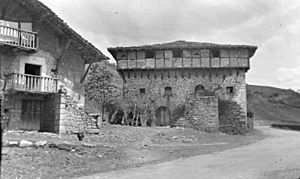
Basques have a strong connection to their home, or etxea. The traditional Basque home is a farmhouse called a baserri. These farms were self-sufficient and run by a single family.
Traditionally, the baserri and its land were not split up. It was passed down to the oldest child, either male or female. This kept the family property together for generations. Many Basque surnames, like Etxeberria ("the new house"), come from the names of these old farmhouses.
Basque Food
Basque food is famous all over the world. The cooking is influenced by the fresh ingredients from the sea and the mountains. Popular dishes often include fish, lamb, beans, and peppers.
A unique part of Basque culture is the txoko, or gastronomical society. These are private cooking clubs where friends, usually men, gather to cook, eat, and socialize. Another tradition is visiting cider houses, or sagardotegiak, to drink fresh cider and eat a traditional meal.
Mythology and Folklore
Before the Basques became Christian, they had their own rich mythology. The most important figure was Mari, a powerful goddess who lived in a cave on a high mountain and controlled the weather. Her husband was a spirit named Sugaar.
Legends also tell of other creatures like:
- Jentilak: Giants who were said to have built ancient stone structures.
- Lamiak: Fairies or nymphs, often found near streams.
- Basajaun: A wild man of the woods who protected flocks of sheep.
One of the jentilak, named Olentzero, later became a Christmas figure, similar to Santa Claus, who brings gifts to children.
Popular Basque Sports
The Basques have many unique sports, many of which started from everyday farm work. People would often bet on who was the strongest or fastest. These are called rural sports, or herri kirolak.
Some popular Basque sports include:
- Pelota: A fast-paced ball game played with a hard ball against a wall. A version of this game, called Jai Alai, is played internationally.
- Wood chopping (aizkolaritza) and stone lifting (harri-jasotzea): Tests of strength.
- Rowing regattas (estropadak): Boat races that come from the tradition of whale fishermen racing to shore.
- Tug-of-war (sokatira): A classic team sport.
Like in the rest of Spain, football (soccer) is very popular. Top teams include Athletic Bilbao and Real Sociedad. Athletic Bilbao is famous for its policy of only signing players who are from the Basque Country.
Politics and Government
The Basque Country is not an independent state. Its territory is divided between Spain and France.
In Spain, the Basque Autonomous Community and Navarre have a high degree of autonomy, or self-government. This means they have their own parliaments, police forces, and control over things like education and culture.
In France, the Basque region does not have this kind of autonomy. It is simply part of a larger French administrative area. Many local leaders in the French Basque Country have asked for their own department, but this has not happened yet.
For many years, there have been political disagreements in the region. Many Basques want more self-government, and some would like to see an independent Basque country. Most people work toward these goals peacefully through politics.
Notable Basque People
- Juan Sebastián Elcano: The first person to sail all the way around the world.
- Ignatius of Loyola: A soldier who became a priest and founded the Society of Jesus (the Jesuits).
- Francis Xavier: A friend of Ignatius and a famous Christian missionary.
- Miguel de Unamuno: A famous writer and philosopher.
- Miguel Indurain: A professional cyclist who won the Tour de France five times in a row.
See also
- Aberri Eguna
- Aquitani
- Basque code talkers
- Duchy of Vasconia
- Genetic history of Europe
- Iberians
- Late Basquisation
- List of Basques
- National and regional identity in Spain
- Spanish people
- Vascones
 | James Van Der Zee |
 | Alma Thomas |
 | Ellis Wilson |
 | Margaret Taylor-Burroughs |


